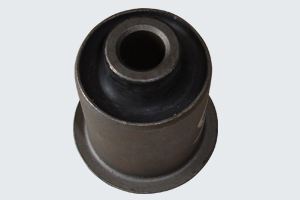Bushing
Parts:
A common application is in vehicle suspension systems, where a
bushing made of rubber (or, more often, synthetic
rubber or polyurethane)
separates the faces of two metal objects while allowing a certain amount of
movement. This movement allows the suspension parts to move freely, for
example, when traveling over a large bump, while minimizing transmission of
noise and small vibrations through to the chassis of the vehicle. A Rubber Bushing
may also be described as a flexible mounting or antivibration
mounting.Based on different embeded material,bushing could be divided into
Steel Bushing,Cpper bushing,Aluminium Bushing,and rubber bushing.
These bushings often take the form of an
annular cylinder of flexible material inside a metallic casing or outer tube.
They might also feature an internal crush tube which protects the
bushing from being crushed by the fixings which hold it onto a threaded spigot.
Many different types of bushing designs exist. An important difference compared
with plain bearings is that the relative motion
between the two connected parts is accommodated by strain in the rubber, rather
than by shear or friction at the interface. Some rubber bushings, such as the D
block for a sway bar, do allow sliding at the interface between one part
and the rubber.
Advantages
and disadvantages:
The main
advantage of a bushing, as compared to a solid connection, is less noise and vibration are
transmitted. Another advantage is that they require little to no lubrication.
Disadvantages
include:
(1)Bushings can deteriorate quickly in the
presence of oils (e.g., motor oil, mineral oil)
and extreme heat and cold.
(2)Flexibility of rubber also introduces an
element of play in the suspension system. This may result in camber, caster, or
toe changes in the wheels of the vehicle during high-load conditions (cornering
and braking), adversely affecting the vehicle's handling.
For this reason, a popular aftermarket performance upgrade is the replacement
of rubber suspension bushings with bushings made of more rigid materials, such
as polyurethane. Polyurethane bushings are also available for many vehicles
with approximately the same characteristics[citation needed] as the manufacturers
original bushings, but with greatly increased durability.This is useful on
vehicles that have a reputation for wearing out standard rubber bushings, but
for which harder bushings with increased harshness of ride are not wanted.
Applications(automobile):
·
Anti-roll bar (US Sway bar)
links and mountings
·
Shock
absorber mountings
·
Double wishbone suspension assemblies
·
Gear stick for
vehicles with a manual transmission
·
Most high-speed inline internal
combustion engines are prone to torsional vibration of their crankshafts; the
straight six and straight eight engines being particularly prone to this
problem due to their long crankshaft length. Although straight eight engines
faded from the marketplace in the 1950s, many straight six engines have and
still do feature crankshaft vibration damping utilizing rubber bushes. The
3,442 cc Jaguar XK 6-cylinder engine of 1948 and
most subsequent versions of the ubiquitous Jaguar XK engine used a proprietary
Metalastik vibration damper to protect their crankshafts from potentially
damaging torsional vibrations. To quote William Heynes, "The
Metalastik damper consists of a steel plate to which is bonded, through a thick
rubber disk, a malleable iron floating weight. Variations of the weight, rubber
volume and mix, give these dampers a very wide field over which they can
operate."
In skateboards,
bushings enable the tilting of the trucks,
thus allowing the board to turn.
In fastening, bushings are also
used to transfer loads from a fastening to a much larger area in the underlying
structure, the object being to reduce the strain on individual fibers within
the underlying structure.
Steel Bushing,Copper Bushing,Aluminium Bushing,Rubber Bushing VESTA Motoring Ltd , http://www.vesta-industry.com
It is understood that the Wangzhuang Pumping Station is located on the west bank of the Caohe Canal. The water collection area of ​​the pumping station is from south to one weft road, north to the outer ring of the area, and west to the four reclaimed roads. The water collection area is over 610,000 square meters. The main pipelines such as Road, Erjing Road and Yiwei Road collect water from the pumping station and into the Can Canal, which will solve the problem of drainage north of the Hexi-Weiyi Canal, especially the problem of water retention in the park. 
A few days ago, Wangzhuang Pumping Station and Xincun Pumping Station, which were tasked with discharging the heavy burdens on the banks of the banks of the Hangu Canal in Tianjin, passed the acceptance and were put into use, laying a solid foundation for urban flood prevention in the future.